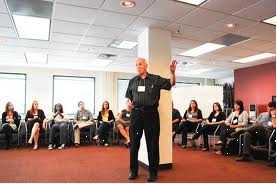Psychology and ELT: Growing. ‘My Greatest Mistake’
Nick Michelioudakis, Greece
Nick Micheiloudakis (MSc, Dip RSA) is a teacher / trainer based in Greece. His interests include comedies, student motivation, as well as Social and Evolutionary Psychology. For comments / questions you can contact him at: nickmi@ath.forthnet.gr or visit his site www.michelioudakis.org E-mail: nickmi@ath.forthnet.gr

Menu
The seminar
The ‘Self-Justification Mechanism’
A long streak of successes
The long-term consequences
Dissonance reduction
The alternative
The benefits
Big ideas
“My greatest mistake”
References

Imagine a large room full of 20 leaders of some prestigious Non-Profit Associations. A seminar is in session. The rules are very simple: each person has to relate one case where they made a mistake as a leader without trying to dodge responsibility for it or say how they tried to make amends. The instructions of Management Consultant Kardon are simple – ‘stay with the mistake’. Here is how he describes the experience: ‘As we went around the circle, the magnitude of mistakes burgeoned… Participants would often get uncomfortable and try to tell a redeeming anecdote, but I enforced the ground rules… A half hour into the session laughter filled the room… it got so raucous that attendees at other seminars came to see what the commotion was about…’ (B. Kardon in Tavris & Aronson 2007).
While some scientists might still debate the question of whether the Earth is flat, few Psychologists doubt the existence of the SJM. The SJM (or Self-Justification Mechanism) is a module within our brains which tries to justify what we do to our own selves (Gilbert 2007). If we screw up it is always for a reason: either we were given the wrong info, or we failed to get the support we should have received, or it was just a series of unfortunate events. At the very least our intentions were noble. Very often, we are so good at it, that we manage to persuade ourselves we did not screw up at all! The more multi-faceted a reality is, the easier this is to achieve. Our memory helps a great deal in that. Research shows that it is not only selective, but also reconstructive; it sometimes actively distorts facts so that what we remember makes us appear in the best possible light… (Schacter 2007)
If you look at people’s CVs or at their blog entries, the articles they have written (my own included!) you will see that their career has been a long streak of triumphs; ‘My Best Lesson’ / ‘My Favourite Activity’ / ‘A New (and of course ‘Brilliant’!) Way of Teaching Voc’ etc. etc. I bet you anything, were someone to conduct such a survey, successes would outnumber blunders by 20 to 1! Whenever a mistake is mentioned it is a) rather insignificant and b) almost always accompanied by mitigating circumstances. There is a problem with such an approach however: we fail to benefit from our negative experiences. In chess, the most heavily analysed games are not one’s victories (these are the ones we brag about!); the ones we spend hours analysing are our losses! Losing hurts! But, you see, chess is different in two key respects: a) you have clearly lost the game (so there is no ‘re-interpreting’ reality) and b) it was clearly your fault! In our day-to-day teaching it is far easier to shift the blame to others: ‘The Syllabus is too demanding’ or ‘The textbook is too boring’ or (far more dangerously) ‘The students lack motivation…’
This last thing is far more serious than the others; each time something goes wrong in class, we have a choice when it comes to attribution – was it our fault or was it the students’? What do you think is the answer our self-serving brain is going to plump for? It was the students’ fault of course! Indeed, this happens all the time; when the police get the wrong person it goes without saying that it was their own fault; when we yell at our partner – well, they have usually done something to deserve it! Tavris & Aronson (2007) give innumerable examples of how easy it is to blame the victim. The problem is that this attribution sets in motion a chain reaction – next time in class we expect our students to be uncooperative and this creates a self-fulfilling prophecy! (Brafman & Brafman 2009)
Not only that; having made a mistake (e.g. by reprimanding a student unjustly) we then tend to find a reason why we did so. But we have also trapped ourselves; next time a similar situation occurs we line up behind our earlier self and we repeat the mistake!! (Ariely 2008)
The mechanism that explains what happens is that of ‘Cognitive Dissonance Reduction’ – first described by Festinger (e.g. in Abelson, Frey & Gregg 2004). The idea is simple: our brain has difficulty believing two contradictory things simultaneously. Imagine that something goes wrong and your perfectly designed lesson turns out to be a total shambles (to make the picture more vivid, imagine that you are also being observed by your DOS!) Now on the one hand you know your lesson was a disaster; on the other you have this view of yourself as a conscientious professional and a good teacher. How do you square these two beliefs? You could say of course that ‘you win some, you lose some’ or ‘even the best teachers are entitled to a bad day’, but it is soooooo much easier to think instead ‘it was the students’ fault!’ / ‘They were too distracted’ / ‘They did not pay attention to the instructions’ etc. etc. ad infinitum… It is important to stress here that this is our default mode! (Fine 2005) And here is an interesting thing: the more experienced we are, the more full we are of ourselves and the harder it is to look at our mistakes squarely in the face!

So what are we to do instead? Well, we could try to harness the dissonance reduction mechanism to our advantage! We could start by acknowledging the existence of the SJM. So the first thing we can do is to simply own up to our mistake. It is important to get it right. ‘Fudging’ things does not cut it – for instance, it won’t do to just say to ourselves something like ‘Hmmm – perhaps I shouldn’t have been so harsh on X’ – the SJM will then get to work subconsciously… (…‘but I was tired / it was late… etc.’). It is vital a) that we clearly take responsibility (e.g. by writing this down in our journal!) b) that we do not allow ourselves to make any excuses (cf B. Kardon) c) that we go public if possible (e.g. by sharing this with at least one colleague) and d) that (if possible) we try to make amends (even if this is just by apologizing).
Think about what happens every time we do this: our brain goes to work, thinking as follows: ‘I have just owned up to a big blunder. Either I am incompetent OR I have attained such a high level in my professional development that I can take such mistakes in my stride. I can certainly make use of this experience to do better next time!’ – which of the two options do you think our brain will choose? Or, again (more importantly): ‘I have just admitted to a serious mistake which has led to my losing face. Either I am stupid OR I am one of these exceptional people who can take responsibility for their actions and grow as an individual!’ – OK, that is hardly a choice, right? Instead of leaving shame-faced you allow yourself to leave feeling the warm glow of the virtuous! And here is the brilliant thing; the benefits are cumulative! Once we have taken a step in this direction, then next time something similar happens we will use our former action as a guide about what to do! Remember Ariely? We tend to follow our own example!
There are a number of Big Ideas at play here, which are worth remembering:
- When something goes wrong, our default setting is Self-Justification.
- It is hard for us to reconcile two dissonant notions in our brain – so we naturally try to reduce this dissonance (often by ‘re-interpreting’ reality).
- Our brain is lazy; we do not like to think too much when trying to reach a decision, so we often ‘line up behind ourselves’.
So my suggestion is this: let us have less ‘great lessons’ and ‘brilliant ideas’ and let us share some of our blunders instead! I would love to hear some of the Professors / Trainers / Writers who regularly feature in Convention programmes talk about some of their mistakes – I am sure we all stand to learn a great deal. Now I know what you are thinking; ‘Can you put your money where your mouth is?’ OK – I will go first. [The story that follows is 100% true.]

It looked like it was going to be yet another very successful lesson with my favourite Proficiency class. About 9 students, around 15 years old, most of them bright and highly motivated. The lesson had started smoothly and we were progressing at a brisk pace, switching from one activity to the next… and then it happened. Halfway through an activity I asked the students to change partners. But one of them (a happy, bubbly and generally compliant girl) said she would rather continue with her friend.
I could of course simply carry on with the activity and let the two girls get on with it but then I remembered all the things I had read in Methodology books about the need for the teacher to be firm and how such an apparently insignificant incident might lead to the gradual erosion of all sense of discipline… The fact that I did not recall all the other things in the same books urging the teacher to be aware of group dynamics, sensitive to students’ moods and preferences and flexible in the implementation of the lesson plan, suggests that the most likely explanation was that I felt rather insecure and I misconstrued a genuine preference as a challenge to my authority! So I decided to be assertive; I explained the reasons why I wanted them to switch partners and told her that it was important.
The girl was more bemused than defiant, but she reiterated that she would rather stay with her friend – and to my increasing annoyance, her friend sided with her! Again, I could have defused the situation by ignoring the incident – and perhaps having a word with the girls afterwards, but no! I instead decided that both my authority and my professionalism were at stake and that I was not going to be swayed from what I ‘knew’ was the best practice. In other words, I was as pig-headed as one could be for fear of losing face. Of course by that stage the girl had trapped herself (if she had yielded at that stage she would have come across as a time-waster [in front of her peers, too!]) and I had managed to place myself in such a tight corner that I could not easily extricate myself – I went a step further and effectively eliminated any chance of a compromise by stating that unless she switched partners, I refused to continue with the lesson! It was stalemate!

Stalemates are happy draws – in chess… This was not to be the case here… Incredibly, we just sat there and stared at each other! One minute passed, then another… With every passing minute the tension mounted – we were supposed to be having a lesson! What was happening? Who was to blame? The class started fidgeting and they all started looking uneasily at each other (‘Do we go now, or what?’) Some more excruciating minutes went by….and then the poor girl could not take it anymore. She broke into tears and run out of the classroom. With 20 or so minutes to go, we simply packed up and went home… (Yes… try topping that one!)
At the time of course I was furious with her – with her friend and with the whole class! How could they do such a thing to me??!?... My favourite students too!! Of course, over the years I have thought about this incident a lot and my feelings have changed. I realise now that the students had not actually conspired to ruin my lesson. Rather it was my own stubbornness that had led to this debacle… Fortunately for me, young people forgive easily and I have remained friends with a number of these students over the years. Only I have lost touch with that girl. I still remember her name though – it was Pagona. So, pointless as it may be, I would like to take this opportunity at least to say ‘Pagona, I am sorry…’
Abelson, R., Frey, K. & Gregg, A. “Experiments With People” Lawrence Erlbaum Associates 2004
Ariely, D. “Predictably Irrational” HarperCollins 2008
Ariely, D. “The Upside of Irrationality” HarperCollins 2010
Fine, C. “A Mind of its Own” Icon Books 2005
Gilbert, D. “Stumbling on Happiness” Harper Perennial 2007
Schacter, D. “How the Mind Forgets and Remembers” Souvenir Press 2001
Tavris, C. & Aronson, E. “Mistakes were Made (But not by Me)” Pinter and Martin 2008

Please check the How the Motivate your Students course at Pilgrims website.
Please check the Building Positive Group Dynamics course at Pilgrims website.


|